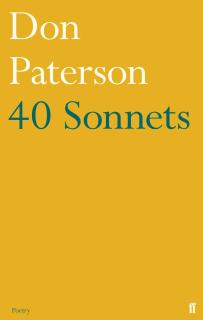Don Paterson’s book of commentaries on Shakespeare’s sonnets was emphatically a poet’s response, rather than an academic’s. Hack work and slack moments were unerringly pointed out, with Paterson as willing to express bafflement or boredom as awe and appreciation. Now he has compounded his cheek with his own highly idiosyncratic takes on the noble form.
Virtually the only agreed rule is that they should have 14 lines. The classic Shakespearean sonnet comprises three quatrains (rhyming blocks of four lines) plus a couplet, all in iambic pentameter, with a “volta”, or turn, breaking the poem after the eighth line into a new thought. (Check out Shelley’s brilliant volta in “Ozymandias”.) Another type favours two quatrains and a sestet. This button-holing, flexible and highly sophisticated form really shows off a poet’s technical chops.
Things quickly get deep. Paterson is a virtuoso in rhyme and metre, and this square text on a white field is for him a sort of box “that poets find useful to think inside”. One of Paterson’s beefs with Shakespeare was the hammering home of themes, the opening sequence repeatedly urging the beautiful young man to marry and multiply being an example. But Paterson is nothing if not varied; here are poems addressed to two young artistic suicides, a funeral elegy, one sonnet about being stuck in a lift, another about a dog being put down, an open letter to Dundee City Council, a one-sided conversation with a cold-caller (“Yeah This is he Aye Donald Just one T”), political poems (one pointedly designated “for Tony Blair”), riddles, jokey poems and those voiced by the humble, supplicant lover.
It’s clever stuff, with Latin epigraphs and allusions to out-of-the-way writers; poems are written “after Du Fu”, “after Nicanor Parra” and “after Ishikawa” (Paterson is big on versions). Nothing ever gets too hifalutin, though: a library is a place “where poor folk go to die / or download porno on the free wifi”, news clichés are mauled against the obscenity of a boy’s death in Gaza, and fancy poetic phrases are dismissed as “some such nonsense”. Drink is taken. “At the Perty” [sic] is only 14 words long, never mind lines, and “Séance” is a series of stuttered letters: “isssk sskpiiikspsppppp”.
For all the fun and games, the most striking poems generally cleave closest to the basic form. A homage to the photographer Francesca Woodman concludes: “All rooms will hide you, if you stand just so. / All ghosts know this. That’s really all they know”, nailing her premature death and self-obscuring art with epigrammatic neatness. In “A Pocket Horizon” the descriptive becomes the metaphysical, the enigmatic turns informal: “Its disc of jet on three gold screws would do / for a doll’s house table at a doll’s house séance. / I’m trying to what exactly. Level with you?”
It’s a collection rather than a sequence and though it will bear many re-readings, at 40 short poems it feels a little light; certainly compared with Shakespeare’s mighty 154. Not so cheeky after all, eh Don?
Subscribe to Independent Premium to bookmark this article
Want to bookmark your favourite articles and stories to read or reference later? Start your Independent Premium subscription today.


Join our commenting forum
Join thought-provoking conversations, follow other Independent readers and see their replies